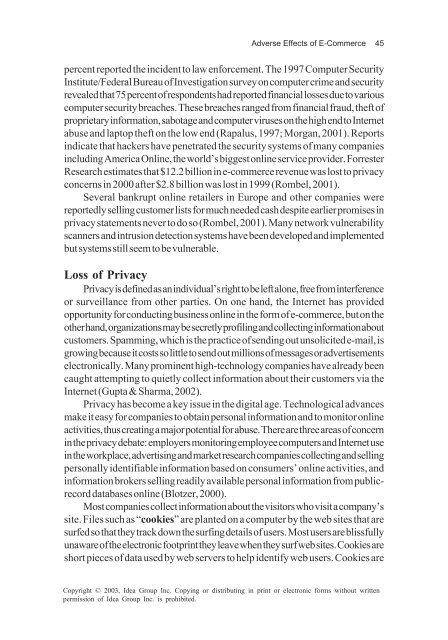www.sharexxx.net - free books & magazines
www.sharexxx.net - free books & magazines
www.sharexxx.net - free books & magazines
You also want an ePaper? Increase the reach of your titles
YUMPU automatically turns print PDFs into web optimized ePapers that Google loves.
Adverse Effects of E-Commerce 45<br />
percent reported the incident to law enforcement. The 1997 Computer Security<br />
Institute/Federal Bureau of Investigation survey on computer crime and security<br />
revealed that 75 percent of respondents had reported financial losses due to various<br />
computer security breaches. These breaches ranged from financial fraud, theft of<br />
proprietary information, sabotage and computer viruses on the high end to Inter<strong>net</strong><br />
abuse and laptop theft on the low end (Rapalus, 1997; Morgan, 2001). Reports<br />
indicate that hackers have pe<strong>net</strong>rated the security systems of many companies<br />
including America Online, the world’s biggest online service provider. Forrester<br />
Research estimates that $12.2 billion in e-commerce revenue was lost to privacy<br />
concerns in 2000 after $2.8 billion was lost in 1999 (Rombel, 2001).<br />
Several bankrupt online retailers in Europe and other companies were<br />
reportedly selling customer lists for much needed cash despite earlier promises in<br />
privacy statements never to do so (Rombel, 2001). Many <strong>net</strong>work vulnerability<br />
scanners and intrusion detection systems have been developed and implemented<br />
but systems still seem to be vulnerable.<br />
Loss of Privacy<br />
Privacy is defined as an individual’s right to be left alone, <strong>free</strong> from interference<br />
or surveillance from other parties. On one hand, the Inter<strong>net</strong> has provided<br />
opportunity for conducting business online in the form of e-commerce, but on the<br />
other hand, organizations may be secretly profiling and collecting information about<br />
customers. Spamming, which is the practice of sending out unsolicited e-mail, is<br />
growing because it costs so little to send out millions of messages or advertisements<br />
electronically. Many prominent high-technology companies have already been<br />
caught attempting to quietly collect information about their customers via the<br />
Inter<strong>net</strong> (Gupta & Sharma, 2002).<br />
Privacy has become a key issue in the digital age. Technological advances<br />
make it easy for companies to obtain personal information and to monitor online<br />
activities, thus creating a major potential for abuse. There are three areas of concern<br />
in the privacy debate: employers monitoring employee computers and Inter<strong>net</strong> use<br />
in the workplace, advertising and market research companies collecting and selling<br />
personally identifiable information based on consumers’ online activities, and<br />
information brokers selling readily available personal information from publicrecord<br />
databases online (Blotzer, 2000).<br />
Most companies collect information about the visitors who visit a company’s<br />
site. Files such as “cookies” are planted on a computer by the web sites that are<br />
surfed so that they track down the surfing details of users. Most users are blissfully<br />
unaware of the electronic footprint they leave when they surf web sites. Cookies are<br />
short pieces of data used by web servers to help identify web users. Cookies are<br />
Copyright © 2003, Idea Group Inc. Copying or distributing in print or electronic forms without written<br />
permission of Idea Group Inc. is prohibited.









